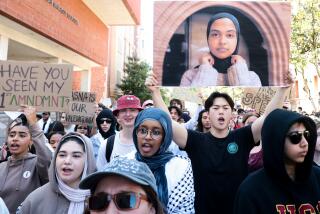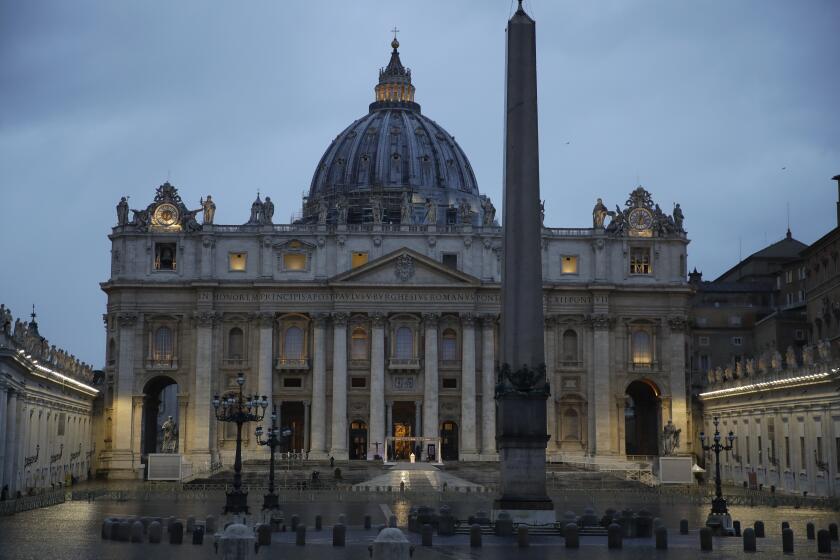Bratton Earns A’s Thus Far
Close to wrapping up an evaluation of Chief William J. Bratton’s fourth year in the job, the president and vice president of the Los Angeles Police Commission say that if the matter were up for a vote this week, they would give him a five-year contract extension.
Although several City Council members have criticized the occasionally acerbic chief, alleging that he has made a few “unprofessional” public comments, commissioners say they are generally pleased with Bratton’s tenure, which has been marked by sharp declines in crime, improvements in officer morale and implementation of many reforms demanded by civil rights advocates.
On Tuesday, the commission is scheduled to meet with Bratton behind closed doors at the City Club at 330 S. Hope St. to discuss his performance. Before that, the panel has set aside time starting at 8:30 a.m. to hear what the public thinks of the chief.
“I personally would support the chief’s five-year renewal,” commission President John Mack said. “Overall, Chief Bratton is doing an outstanding job. He is human, so he is not perfect, but clearly he is providing visionary leadership and the kind of leadership the LAPD needs to continue to transform.”
Though the vote on whether to give Bratton, 58, another five-year term is about a year away, commission Vice President Alan Skobin said he also was prepared to extend the chief’s tenure.
“We are fortunate that he is our chief,” Skobin said.
Even the panel member who has questioned Bratton the most on policies and procedures has expressed her support. At a recent meeting of the five-person panel, commissioner Shelly Freeman said she was “very impressed” with Bratton’s leadership.
“We don’t always agree on everything, but I have tremendous respect for him and I do think that he is the right person to lead this department,” Freeman said.
In addition to potentially providing the chief with a fat raise, this year’s performance evaluation is a key appraisal for Bratton, coming just months before he begins the process of seeking a second five-year term.
Bratton’s first term ends in October 2007, and the City Charter requires him to notify the commission by March whether he wants a second and final term. If retained, he would be the first chief to be kept on since the 1992 redrafting of the City Charter, which gives the Police Commission power to reappoint the chief or not. If he is reappointed, it would take the votes of 10 of the 15 City Council members to overturn the decision.
Political science professor Tom Hogen-Esch said he expects the next reappointment decision to be less contentious than the last two, when the commission decided not to give second terms to Bernard C. Parks, now a city councilman, and to Willie L. Williams.
“This time around it’s pretty much a slam-dunk,” predicted Hogen-Esch, a veteran City Hall watcher who teaches at Cal State Northridge.
But, though commissioners may be glowing in their praise of Bratton now, a lot can happen in the year remaining in his term.
Indeed, the 40% drop in crime during Bratton’s tenure the last four years may be impossible to sustain.
Violent crime is down a paltry 1.1% so far this year compared with 2005, undermined largely by a 9% rise in robberies.
Commissioners said it is remarkable that violent crime, including homicides, is still in decline, given the steep drops in previous years and that the national trend is upward.
In determining whether the chief can be blamed if crime begins to increase, Skobin said his judgment would be based on whether Bratton has taken all actions possible to keep crime in decline.
“I’m not aware of anything he is not doing that he should be doing,” said Skobin, a San Fernando Valley attorney.
Another key test for Bratton will be whether he can make substantial progress toward meeting targets for expanding the police force by 1,000 officers during the next five years.
Though money is available, the department has struggled to meet hiring quotas in the last year. The department needs to graduate more than 50 recruits each month to meet hiring goals, but only 33 recruits completed the class that graduated Friday, and last month 28 graduated.
Bratton has enjoyed strong support from Mayor Antonio Villaraigosa, who appoints the police commissioners, but the mayor said during a meeting with the chief and the panel in July that he planned to hold Bratton accountable for reaching the hiring goals.
“You heard me say what a great chief we have -- and we do -- but I’ve also said to our chief that he’s responsible for recruiting, hiring and retaining those 1,000 new police officers,” Villaraigosa said.
Bratton has said he believes the hiring goals will be reached.
The chief’s record during the last year is not without blemishes. He faced criticism from council members and others in March for spending more than one-third of last year -- 125 days -- traveling out of town, though he said many of the trips were on police business.
In July, a task force criticized the department for maintaining a “warrior policing” style left over from the days of the Rampart Division corruption scandal that preceded Bratton’s appointment. And in May, a federal judge ruled that the LAPD had failed to complete all reforms ordered in the scandal’s wake.
U.S. District Judge Gary A. Feess extended a consent decree against the department for three more years, rejecting Bratton’s request to lift the federal order because most of the reforms had been achieved.
The chief’s performance evaluation also may include a note on his sometimes confrontational style. In July, five council members formally complained to the commission after Bratton told a television interviewer that two members “don’t know what the hell they are talking about” when they criticize LAPD hiring policies.
Although an investigation by the inspector general is pending, one commissioner privately downplayed the incident, saying Bratton has demonstrated restraint in other situations.
Bratton has also escaped harsh criticism from commissioners after the Rampart blue-ribbon panel in July issued a report warning that despite extensive reform in the seven years since the scandal, the department remains at risk of similar crises.
Heading off any flak that might have gone his way from the Rampart report, Bratton quickly embraced key recommendations from the task force, whose members commissioners said they had appointed at his urging.
“Chief Bratton knows how to fix this department,” civil rights attorney Connie Rice said at the time, speaking as chairwoman of the blue-ribbon committee.
On the consent decree, Feess ruled that the department had failed to implement one of the most important Rampart reforms: the creation of a computer system called Teams II to track the behavior of officers.
Mack said not all the blame can be placed on Bratton because “he inherited the Teams II problem.” But, Mack added, “Clearly, there are some areas where the chief recognizes with the commission that there is room for improvement.”
*
More to Read
Start your day right
Sign up for Essential California for news, features and recommendations from the L.A. Times and beyond in your inbox six days a week.
You may occasionally receive promotional content from the Los Angeles Times.







